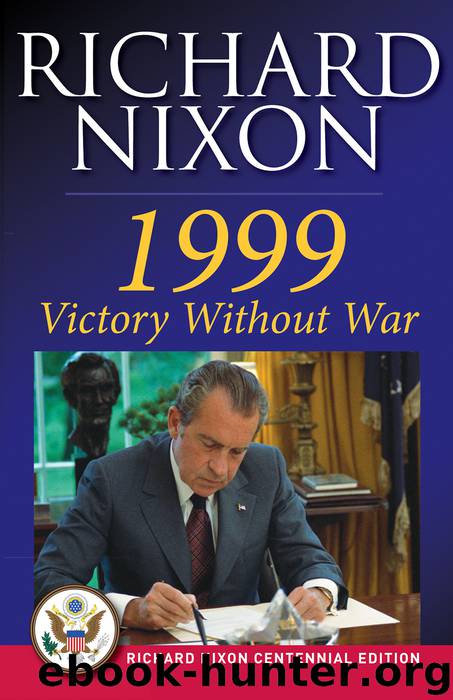1999 by Richard Nixon

Author:Richard Nixon [Nixon, Richard]
Language: eng
Format: epub
Publisher: Simon & Schuster
Published: 0101-01-01T00:00:00+00:00
Those who oppose the idea of negotiating with Moscow also oppose summitry between the superpowers. Summits, in their view, not only have the drawbacks of negotiations in general, but they also benefit the Soviets disproportionately. With their unavoidable champagne toasts and diplomatic cordiality, U.S.–Soviet summit meetings legitimize the Kremlin leaders in the eyes of the world, regardless of the brutal policies they pursue in distant places like Afghanistan.
That view is understandable, particularly given our poor track record at summits. All too often, we have seen an American President captivated by the notion that if only he and his Soviet counterpart got to know each other and succeeded in developing a new tone or spirit in their relationship, then U.S.–Soviet problems would be solved and tensions would wane. This led to the vaunted “spirit” of Geneva in 1955, of Camp David in 1959, of Vienna in 1961, of Glassboro in 1967, and again of Geneva in 1985. But while these spirits improved the atmosphere of U.S.–Soviet relations, they did nothing to resolve the major underlying issues. When a summit is all spirit and no substance, the spirit evaporates fast.
We need to face the hard reality that spirit and tone matter only when leaders of nations with similar and compatible interests have a misunderstanding that can be resolved by their getting to know each other. Such ephemeral factors are irrelevant when nations have irreconcilable differences, as do the United States and the Soviet Union.
But that does not mean that American–Soviet summits serve no beneficial purpose. Summits can play a decisive role in serving peace. But they contribute to a genuine improvement in East–West relations only if both leaders recognize that tensions between their countries are caused not by misunderstanding but by diametrically opposed ideological and geopolitical interests. Most of our differences will never be resolved. But the United States and the Soviet Union have one major goal in common: survival. Each has the key to the other’s survival. The purpose of summit meetings is to develop rules of engagement that can prevent our profound differences from leading to an armed conflict that would destroy us both.
We must recognize that despite forty-four years of peace a world war remains possible. From the least to the most dangerous, there are seven potential causes of such a conflict: (1) a calculated decision by the Soviet leadership to launch a first-strike attack on the United States; (2) an attack on NATO forces by Warsaw Pact forces or on Japan by the Soviet Union; (3) war by accident, in which one side launches a nuclear attack because of some kind of mechanical malfunction; (4) nuclear proliferation, which could put nuclear weapons into the hands of a leader of a minor revolutionary or terrorist power who would be less restrained from using them than the major powers have been; (5) a Soviet preemptive strike to liquidate the Chinese nuclear arsenal, a war which would inevitably drag in the United States; (6) escalations of small wars in areas where
Download
This site does not store any files on its server. We only index and link to content provided by other sites. Please contact the content providers to delete copyright contents if any and email us, we'll remove relevant links or contents immediately.
The Unsettlers by Mark Sundeen(1692)
1610396766 (N) by Jo Ann Jenkins(1681)
When the Astors Owned New York: Blue Bloods and Grand Hotels in a Gilded Age by Justin Kaplan(1360)
Reclaiming History by Vincent Bugliosi(1345)
The House Of Medici by Christopher Hibbert(1336)
Reds by Ted Morgan(1167)
The Creation of Anne Boleyn by Susan Bordo(1067)
The Compton Cowboys by Walter Thompson-Hernandez(1049)
Diplomacy by Henry Kissinger(1005)
Abraham Lincoln: A Life, Volume 2 by Michael Burlingame(976)
Four Great Americans: Washington, Franklin, Webster, and Lincoln (Yesterday's Classics) by Baldwin James(969)
Japan by Edwin Reischauer(967)
The Vindications by Mary Wollstonecraft(957)
The Bully Pulpit: Theodore Roosevelt, William Howard Taft, and the Golden Age of Journalism by Goodwin Doris Kearns(952)
2020-08-04 17:03:28.438602 by Unknown(939)
101 Things You Didn't Know About Lincoln by Brian Thornton(921)
English Verbs by Collins(911)
Two Americans by William Lee Miller(903)
Confederates in the Attic by Tony Horwitz(902)
